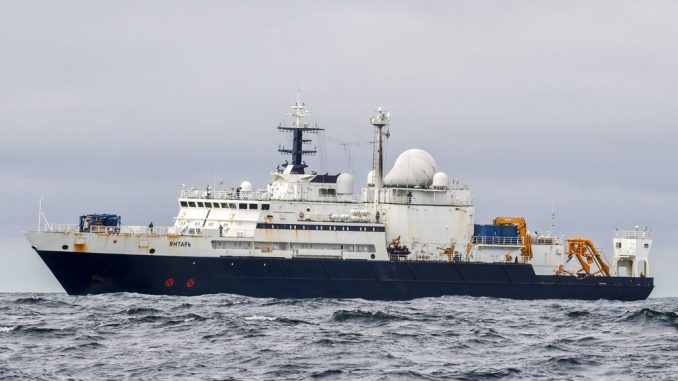
Navy escorted almost twice as many Russian ships in the North Sea
The Dutch Navy is increasingly escorting suspected Russian ships in the North Sea. In the past year, the number has almost doubled, from eleven Russian ships in 2023 to twenty in 2024. This was announced by the Ministry of Defense after questions from NOS.
According to Defense, the fact that more Russian ships are being monitored in the North Sea is due to the changing security picture.
In the past year, the navy escorted several Russian naval vessels, such as the Admiral Golovko and the Soobrazitelny. But Russian research ships such as the Yantar were also monitored. Formally, Yantar conducts maritime research, but according to analysts, Russia uses these types of research ships to map vital infrastructure at sea.
We see that this deterrent works, when we are in the area, ships pass by.
Defense Press Officer Lonneke van Kollenburg
This vital infrastructure in the North Sea consists of gas pipelines, but also submarine power and data cables. The Military Intelligence and Security Service (MIVD) previously warned that Russian ships are investigating the possibilities for espionage and sabotage of this infrastructure.
“We see that Russian research ships sail back and forth above these types of cables for a long time,” says HCSS defense specialist Patrick Bolder. “That’s just a military operation, there are armed soldiers on those research ships.” The Yantar has several unmanned submarines on board, with which it can, for example, reach submarine cables.
According to Defense press officer Lonneke van Kollenburg, tracking suspicious ships helps prevent these types of actions. “We escort ships for monitoring, deterrence and possible evidence. If we see something happening that is not allowed, we can intervene and we also have direct evidence for this. We also see that deterrence works when we are in the area, sailing ships through.”
Escorting suspicious ships is one of the ways in which the Netherlands can secure its undersea infrastructure. In the video below you can see what other options are available:
Shadow war at sea: how do we protect our data cables?
The bar for actually boarding a suspicious ship is high, Bolder explains. “Ships are allowed to sail freely at sea. That is an important principle for international trade at sea and also a Dutch principle. Hugo de Groot came up with that.”
That is why Russian ships also have the right to free passage and the navy can often only follow and guide them. Intervention is only possible if they are caught red-handed during sabotage attempts. “But for that you have to be in the area,” says Bolder.
That makes the outcome in the case around Eagle S also very interesting according to the defense specialist. According to Finland, that oil tanker is responsible for damaging important cables in the Baltic Sea and has since been detained by Finnish authorities. Bolder: “This will be important for how we deal with suspicious ships in the future and what legal options there are to tackle those ships.”
In addition, according to Bolder, it could have consequences for how other countries deal with European ships.
10,000 km of pipelines and cables
In addition to research ships and naval vessels, the Dutch navy also tracked civilian Russian ships, for example the fishing vessel Atlantida and the oil tanker Geral Skobolev. According to Russia’s maritime doctrine, these types of civilian ships can also be used for military purposes.
A challenge in tracking ships is the large size of the Dutch exclusive economic zone, the area at sea where the Netherlands has special rights and responsibilities. There are approximately 10,000 kilometers of pipelines and submarine cables. This makes it difficult to supervise and be physically present everywhere.
In order to better perform these tasks at sea, Defense will receive several new ships. This concerns support ships and ships that can detect and combat submarines.
According to Bolder, it is crucial that the Netherlands has its maritime security in order. For example, the Netherlands is increasingly dependent on offshore wind energy, which requires submarine power cables. In addition, the Netherlands is an important transit and trading country. Bolder: “If our data cables are damaged, this could have consequences for our services. And therefore for the reliability of the Netherlands for international trading partners.”

Be the first to comment